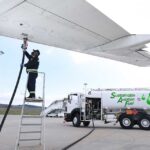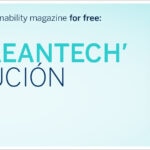Cleantech in aviation: sustainable fuels for decarbonization
The aviation industry consumes 380 billion liters of fuel every year, or three percent of global CO2 emissions. Sustainable aviation fuels (SAF) are the most advanced cleantech alternative to decarbonize this industry, with innovations such as those of the startup Twelve, which have managed to reduce emissions by up to 90 percent compared to traditional fuels.

The aviation sector is one of the hardest to decarbonize. The biggest barrier is that there is currently no alternative that is more efficient or financially sustainable than jet fuel, which is made of various types of oil products. However, several promising solutions are under development in the long-term (electrification, hydrogen, etc.) while the enhanced efficiency of aircraft is already a reality. In any case, sustainable aviation fuels currently remain the most advanced alternative.
These fuels work just like oil products so aircraft interventions are not necessary, and they can be made from waste products, such as used oil or from carbon capture from the air.
Twelve’s role in the decarbonization of aviation
Twelve is a U.S.-based startup that describes itself as a carbon transformation company with a mission to eliminate global carbon dioxide emissions and build a future without fossil fuels.
Twelve has developed a groundbreaking carbon transformation system: an industrial-scale electrolyzer that mimics photosynthesis by converting carbon dioxide, water and clean energy intro hydrocarbons. These hydrocarbons can then be used to produce chemicals that generate 90 percent fewer emissions than conventional fuel and uses significantly less water and resources compared to SAF made from vegetable oils and by-products.
“Our technology has been proven to work. The biggest challenge now is scaling up production of SAF to a level that can meaningfully reduce the carbon emissions by the aviation industry. Aviation accounts for three percent of global emissions with commercial airlines consuming 380 billion liters annually,” company representatives explain. “Our next step toward this goal is the completion of AirPlant One, Twelve’s first SAF production facility, located in Moses Lake, Washington (U.S.). This plant will be the first of many across the country dedicated to producing sustainable aviation fuel.”
Other sustainable fuels
Within the alternative fuels sector, SAFs are not the only option. Biofuels for cars and trucks (produced from vegetable oils, animal fats or recycled restaurant grease), synthetic fuels (created from synthetic gases derived from coal, natural gas or biomass), as well as synthetic methane, biomethane and methanol for freighters and other large cargo ships are among the most promising cleantech solutions.
These developments are in line with global decarbonization targets, offering sustainable alternatives that could transform the most difficult sectors, like the aviation and shipping industries.
As technologies like alternative fuels continue evolving, the ability to reduce carbon emissions increases, leading to a faster transition to a low carbon economy. Cleantech solutions like these not only provide an answer for high emission industrial sectors, they also help to diversify energy sources, contributing to global energy independence and greater resilience to energy crises. In the long-term, these fuels could play a key role in building sustainable energy infrastructure with a low environmental impact.
